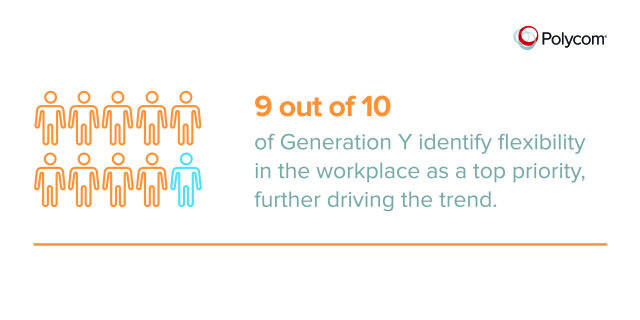 Studies find three main drivers of the workplace of the future: flexibility, autonomy and ease of use
Studies find three main drivers of the workplace of the future: flexibility, autonomy and ease of use
India, Hyderabad – September 24, 2015 – Research commissioned by Polycom, Inc. (NASDAQ: PLCM) shows that in addition to technology advancements, employees are actively shaping the environments of the workplace of the future. One of the top business objectives for all organisations is to better enable the workforce through the right tools and technology solutions, allowing employees the flexibility to work from anywhere.
According to the study conducted by Virgin Media Business, China is the most advanced country in allowing and enabling staff to work from any location, on any device (69 per cent), closely followed by the United States (63 per cent). The study also showed that these nations lead the world at 48 per cent of companies in each country – well above the global average of 29 per cent.
More than 90 percent of employees in the U.S. work remotely at least once a week with Virgin Media Business predicting that globally, 60 percent of office-based employees will regularly work from home by 2022.
- Two out of three of the world’s most effective leaders are unwilling to re-locate
- 69 percent say remote working is critical to relieving work-related stress
According to Sir Cary Cooper, Professor of organisational psychology and health at Manchester Business School, the future worker has three key criteria for their technology whether at home or at work: flexibility, autonomy and ease of use. The result will increase productivity and job enjoyment.
VUC Storstorm, a Polycom customer, has centred its programme, ‘The Global Football Classroom,’ on offering complete flexibility to enable students’ academic and athletic success. A unique platform created for the Danish Football Association enables players to attend classes together in a virtual classroom when they are not on the field.
“It is often difficult for these young players to prioritise education when they are following their dreams. We need to make class easily accessible and flexible so they can complete their diploma,” says Kristian Madsen, Head of Project Development at VUC. He adds, “Through Polycom solutions we make it possible for their football training and their academic education to go hand in hand. It gives these young people the best opportunities for the future.”
With the transition happening in the workplace, video collaboration is being deployed by leading edge companies across the globe, providing employees the flexibility to effectively work from anywhere and connect face to face to share ideas, learn and solve problems.
